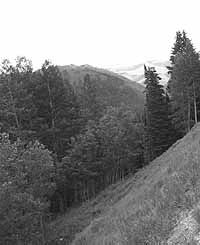| Forests and wildlands create impressive natural scenery for Carbon County residents as well as visitors to enjoy. But irresponsible people are threatening the public lands. The Utah Legislature passed the Forest Protection Act of 1987 prohibiting the collection of flora from public lands. The state law makes it illegal for people to transport any forest product or native vegetation without proof of ownership. Violation of the statute is a class B misdemeanor category criminal offense, punishable by a hefty fine along with a sentence in the county jail. |
It used be that people needed to be protected from nature when outdoor enthusiasts were camping, hiking or fishing.
Now, state and federal agencies are wondering whether the tables have turned.
During a summer of thousands of fires burning in the wildlands of the West, a season when thousands of tourists as well as recreationists are using public lands and a time when motorists see hundreds of pieces of litter alongside the highway while traveling down the road, it is probably a logical supposition.
But the destruction and problems people can cause in forests are not always the things that seem logical or obvious.
Activities like removing plants or cutting firewood improperly can damage a forest. The activities are also illegal. But some of the rules may not be as obvious to people as the regulations should be.
For instance, the Utah Legislature passed the Forest Protection Act of 1987 to stop people from collecting flora from public lands. The state law makes it illegal for residents to transport any forest product or native vegetation without proof of ownership.
The statute defines forest products and the vegetation as native ornamentals, shrubs, cacti, roots or bulbs, posts, sawed logs, firewood Christmas trees and poles made from native woods.
The purpose of the act is to protect the property of private landowners as well as forests and wildlands from stripping. Some people take the designated items away for personal gain, without paying for or obtaining the proper permits to haul the materials.
To transport the items in question, the motorist operating the vehicle must have proof of ownership of the materials or plants.
The driver should have possession of a contract, permit, bill of sale, bill of lading, receipt or other legal instrument issued by a landowner or proper state or federal agency.
The rules apply for transporting materials or plants within the state or for out of state use.
There are instances when the designated documents are not needed. Exceptions include when people are removing forest products from private land and when individuals are transporting firewood incidental to camping or picnicking.
According to officials, the law has allowed managers of forests and public lands to direct individuals who wish to gather materials from public lands to areas where they want to reduce fire hazards, improve timber stands and to also help in the control of disease in plants.
Violation of the statute is a class B misdemeanor category offense and can carry a hefty fine along with a jail sentence.
In a related area of protection for the forest, most public land agencies caution people who have fire wood permits to be extremely careful about the kind of wood they gather.
The reason for the warning is that many of the chucks of wood that people favor for firewood, also act as homes for animals and some plants.
For instance, dead and dying trees provide food and shelter for many kinds of animals.
Hollow trees, trees with broken tops or places where visible nests are located all act as places for animals to live.
According a group called Animal Inn from Oregon, one-third of all native animals in forest used the identified types of trees for living quarters.
Some rules residents should keep in mind when gathering fire wood include not removing dead trees with trunk holes or visible nests from the forest. In addition, fallen trees also act as places for animals to live.
Carbon County residents should try to follow the measures not only on public lands, but in private wooded lands whenever possible.

